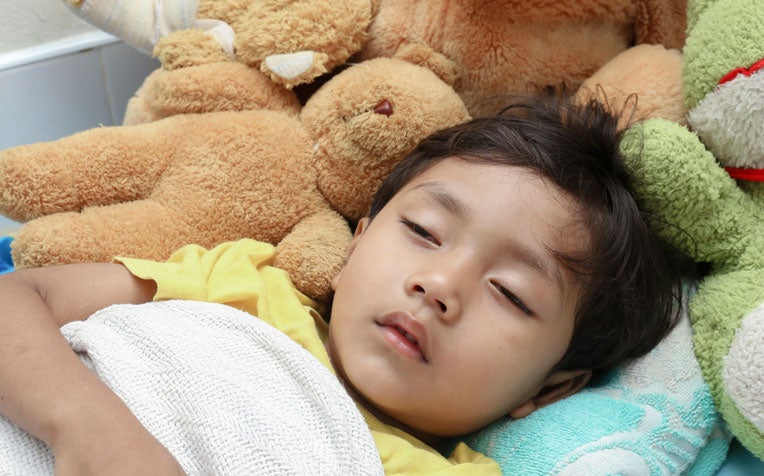
Meningitis - An inflammatory disease of the brain and spinal cord that children, including newborn babies, are particularly susceptible to.
In meningitis, the membranes or meninges surrounding the brain and spinal cord get inflamed and swell up, usually because of an infection. This infection can be bacterial, viral or fungal in nature.
Viral meningitis is the most common, particularly in children below the age of five. It is usually not life-threatening and the patient can recover in a few weeks. Bacterial meningitis, however, is serious and can cause brain damage and even death.
“Meningitis is one infection where one ounce of prevention is really worth much more than a pound of cure, because once damage sets in, treatment may no longer be effective. Or it can only save what has not been damaged,” says Dr Thoon Koh Cheng, Head and Senior Consultant at the Infectious Disease Service, KK Women’s and Children’s Hospital (KKH), a member of the SingHealth group.
What causes meningitis?
Viral meningitis: The enterovirus is the most common cause of viral meningitis. However, the herpes simplex virus, and viruses causing mumps, measles, rubella and chicken pox can also cause viral meningitis.
Bacterial meningitis: The most common cause of bacterial meningitis is the Streptococcus pneumonia (pneumococcal) bacteria which causes ear and sinus infections. Other causes of bacterial meningitis include the Haemophilis influenza type B bacteria, Listeria bacteria and the meningococcal bacteria.
Fungal meningitis: This is an uncommon type of meningitis caused by a fungal infection. It can mimic bacterial meningitis.
In rare cases, meningitis can also be caused by chemical reactions and drug allergies.
Why are children susceptible to meningitis and how can I protect my child from getting the disease?
Children may be particularly susceptible to meningitis because of a lack of prior immunity against the infecting agent. Children who have missed the recommended vaccinations are at higher risk of getting meningitis. An underlying genetic susceptibility may also be involved.
“There may also be an increased ability for children to manifest the signs and symptoms of meningitis,” says Dr Thoon.
Since there are various types of infections that can cause meningitis, a multi-pronged approach is required to protect your child from getting the disease. This approach would involve vaccinating your child against meningitis and adopting hygienic habits to protect your child from picking up an infection.
“Classic bacterial and some viral meningitis can be prevented by vaccines, and one must be aware that the efficacy of vaccines is not 100 per cent, although if enough children are vaccinated against them, then the risk of infections can be greatly reduced,” says Dr Thoon. “It’s also important to have a high personal level of hygiene to prevent infections in general.”
What are the symptoms of meningitis in children?
Meningitis symptoms can be similar to influenza symptoms in children in the early stages of the disease.
Meningitis symptoms include the following:
- Sudden high fever
- Severe headache
- Vomiting
- Stiff neck
- Drowsiness
- Confusion
- Coma or seizures
- Fear of light
- Lack of interest in food/drink
A newborn baby with meningitis may cry constantly, and may develop a rash and a bulge in the soft spot on the head.
“As meningitis and influenza share some symptoms, they can be hard to tell apart from a laymen’s perspective. If in doubt, please consult a medical professional,” says Dr Thoon.
In severe cases of meningitis, the patient can develop complications such as:
- Cognitive impairment (mental retardation)
- Cerebral palsy
- Hydrocephalus (build-up of fluid pressure in the brain)
- Vision and hearing impairment
How is meningitis treated in children?
Viral meningitis is likely to improve on its own without any medication. Your child may be given painkillers and other over-the-counter medications to relieve symptoms. If the cause of the viral meningitis is the herpes virus, the patient may be treated with anti-viral medications.
Bacterial meningitis requires prompt treatment with antibiotics. In severe cases of bacterial meningitis, steroids may be used to reduce the damage caused by the bacterial infection. Surgery may be required for some patients, to drain pus or reduce fluid pressure in the brain. If antibiotic treatment is not provided in time, a patient with bacterial meningitis can deteriorate rapidly.
Patients who recover from severe meningitis, may require physiotherapy and occupational therapy or speech therapy for rehabilitation.
Ref: R14
Contributed by















 Get it on Google Play
Get it on Google Play